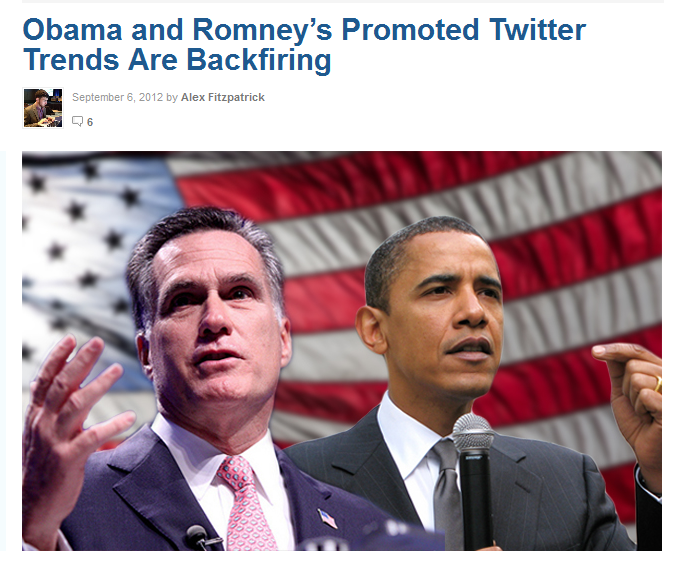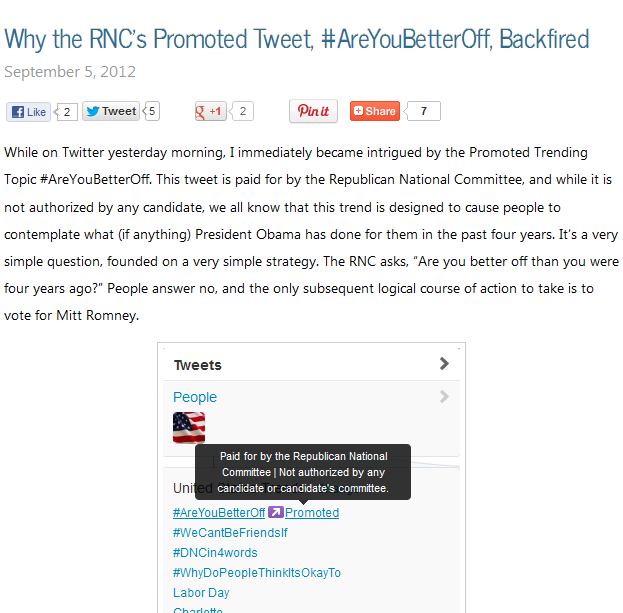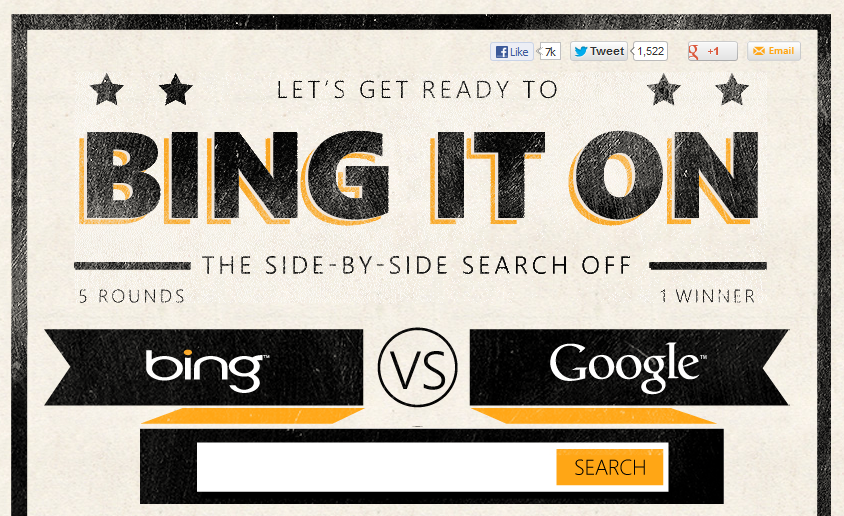Last week, I wrote a blog post on why the RNC’s promoted tweet, #AreYouBetterOff, backfired. I was surprised to see a similar story on Mashable two days after I published my post. Did I “break” a story before Mashable? Is this real life?
I term this resemblance uncanny. I have nothing to declare except my genius.
This strange, unexpected turn of events got me thinking about different types of content. Now, Mashable and I published very similar content (and I actually published mine first. Boss.). Dare I say I thought my blog post slightly better than Mashable’s? The story on Mashable was good, but it consisted primarily of snippets of tweets featuring the promoted Twitter Trends in discussion and very little text.
Yet, there’s a major difference between my post and Mashable’s. Mashable received hundreds of social shares from this post.
My post won’t receive hundreds of Facebook likes or tweets, yet the content is extremely similar. Chalk it up to too much reading on HubSpot or SEOmoz, but the first thing I thought of after this comparison was the ubiquitous, inescapable buzz phrase: “Content is king!” Everyone and their webmaster knows that one way to increase social shares, page views, and leads is to produce “killer content” (this phrase is also completely unavoidable. Trying to avoid it is an exercise in futility.). If you build good content, they will come. Yet, this isn’t always true. Of course, the simple explanation behind the disparity in social shares between Mashable’s post and mine is simply that more people viewed Mashable’s post, because the site draws a larger audience. But, I think there is a larger issue at work here.
Mashable can pump out numerous articles consisting of mediocre content (I’ve seen more than one of this variety), and they’ll still be “king.” These articles will still garner likes and tweets and gather a great number of comments, simply because they’re written by Mashable, and the Mashable name carries weight, substance, and clout. The name alone ensures that the site will never face a social-sharing or page-view drought, even if content is, at best, average.
Cue Mythbusters: Is Content Really King?
Mashable isn’t the only site that causes me to question how name recognition factors into the spread of content. Consider The Huffington Post. They featured an article entitled, “Michelle Obama Gray Nail Polish Sparks Trend” that received over 1,200 comments. Really? I guess a lot of people felt the need to weigh in on the innovativeness of concrete-colored polish; people like this:
Classy, sassy, and fly. I wish I could say the same for the article. It’s ok, though; I’m stillstandingkickingbutt.
When mediocre content becomes popular, I question, is content really king? I think content is king for the most part, but clearly not all of the time. What’s the role of name recognition in the promotion and sharing of content? Is name recognition an exception to the day-old aphorism? Does it throw a wrench in the borderline-cliché pronouncement?
Maybe content matters only up to a certain point: in order to build a reputation as a credible source of news and commentary, a website/magazine/newspaper must publish good content, but once that reputation is established, will any content become popular as far as page views and social shares are concerned?
I wanted to embark on my own Mythbusters-esque expedition and see what the verdict is on content, kings, digital kingdoms, and social sharing empires.
Cue Shakespeare: “What’s in a Name?”
The concept of name recognition is rooted in the idea of word association. Certain words conjure up images, nouns, and adjectives in our brains, and I think some of these associations are virtually universal. Take the word “Harvard.” We associate this word with intelligence and smart, brainy individuals. Or consider the words “New York Times.” Journalistic integrity, talented writers, and maybe even frustratingly difficult crossword puzzles come to mind.
It’s through these word associations that name recognition becomes a factor in our decision-making processes, whether it’s the products we buy, the services we subscribe to, or the content we read. Blind taste tests serve as additional evidence that names alone have the power to skew our perceptions. The search engine Bing recently put a unique spin on the idea of blind taste tests with their “Bing It On” campaign. We all know that Bing has a less-than-stellar reputation; many people see it as second-rate when compared to Google. (Maybe it’s because Bing hasn’t entered our vernacular as a verb like Google has. Maybe it’s because Ryan Seacrest used to plug it on his radio show. I don’t know.) To temporarily cleanse people’s minds of this pejorative view and prove that despite popular opinion, Bing really is a capable search engine, Bing launched a side-by-side search off. People search for a word or phrase, and they are then presented with two pages of search results, one belonging to Google and one belonging to Bing. They don’t know which results belong to which search engine, so they select the “winner” based on the quality of results alone.
After five rounds, individuals find out which search engine won each round. (I chose Bing three out of five times. I’m not sure how to handle this.)
Bing knows name recognition factors quite heavily into the choices we make, and that works against it, whether because Google has such recognition that people ultimately gravitate to it, or because the Bing name generates negative reactions in people. The solution: table the name and focus solely on quality.
I was recently reminded of just how much power a name can hold while perusing the top ten singles on iTunes. Taylor Swift recently released a new single (the lyrics of which she stole directly from my AIM profile in sixth grade), and of course this single was number one on the list. The person in me who believes that the palate of everyday Americans is slightly refined (though the fact that Honey Boo Boo tied Bill Clinton’s speech at the DNC in number of viewers is making it extremely difficult to adhere to this belief) likes to think that this song is not popular solely because of its musical quality (or lack thereof). A big part of its popularity is due to the fact that it’s a Taylor Swift song. This kind of thing happens all the time: any popular singer releases a song, and this song shoots to the top of the Billboard charts, the rise fueled by the fame of the artist alone.
I think name familiarity is important, and maybe sometimes it even trumps content or quality. However, not content to rely on my own personal, anecdotal evidence and experience, I turned to research. I found a wealth of studies that reveal the importance of name recognition. After reading several of them, I culled a few significant, interesting pieces of information.
See Me, Like Me
Researcher Robert Zajonc’s work reveals a phenomenon called the mere-exposure effect: people develop a preference for something simply because they are familiar with that thing. We like things merely because we are exposed to them, because when things become more familiar to us, they feel safe and secure.
Along the lines of the mere-exposure effect is the idea of perpetual fluency: name recognition and familiarity simply and only lead to greater support.
According to these concepts, the big-name, popular websites are king not because of what they produce or curate, but rather because their frequent presence induces in people warm feelings of familiarity. And, what’s interesting is the concept that the more we see something or hear about something, the more we like and support that thing. This phenomenon is one directional: we won’t become familiar with something and not like it. We will always like it. If we can apply Zajonc’s research to the digital marketing world, if a recognized, well-known website produces poor content, it’s o.k. The site will still be king of the online world all because of familiarity.
A Case for Oscar Wilde: “Familiarity Breeds Consent”
I also came across a paper entitled Brand Familiarity and Advertising, which talked about the frequency effect, which is when people think along the lines of: “I’ve seen this more than other brands. It must sell well. It must be good. I’ll buy it.” The frequency effect refers to the tendency we have to connect ubiquity with quality. I frequently fall victim to this. If I read an article on a website that I’ve frequently seen coworkers and other professionals reference, I’m more likely to take this article at face value. The points put forth in this article must be valid and accurate, because people talk about this website all the time. The content must be good. Yet, if I read this same article on a more obscure site, would I still deem the content high quality?
Talking Politics
The power of name recognition also figures very heavily into politics. One study examined name recognition as it pertains to political candidates and found that people infer in name recognition “greater viability.” We tie popularity to viability, and I think this translates directly to content. “I’ll read this article from ____, because ______ is popular, so their articles must be reliable, articulate, interesting, etc. They have to be popular for a reason.” Thus, do people read an article because the article itself is excellent content, or do they read it because of the site on which it is published? The fact that we can even ask this question complicates the idea that content is king.
The Bottom Line
To circulate back to my original question, I think one reason why the particular aphorism that purports that high-quality content is key to securing readers is so popular is because there’s a certain fairness to it, not to mention an alluring simplicity. If I consistently write things that are articulate, intelligent, and unique, then I will build a loyal, engaged (ultimately paying) following. And I think in a lot of cases this is true. No website or printed publication that publishes only low-quality content will become popular. But, sometimes this isn’t true. Name recognition seems to occasionally usurp the throne.
Yet, even if the buzz phrase “content is king” doesn’t have absolute value, it still has a great deal of truth to it. Here’s to continuing to strive for producing interesting, intriguing, and thoughtful work.
And turning a blind eye to iTunes and certain tweets sent out by The Huffington Post.
Let Bravo handle the trashy yet unexplainably irresistible Real Housewives content, Huff Po.
View the original post at Mainstreethost.





